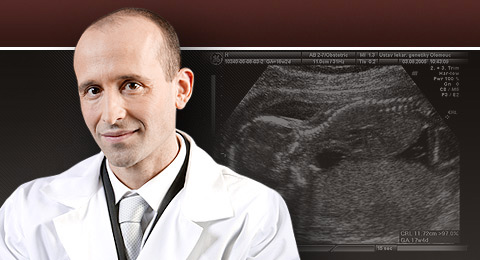Studničková M., Holusková I., Durdová V., Kratochvílová T., Strašilová P., Marková I., Ľubušký M. Spontánní antepartální RhD aloimunizace. Čes. Gynek., 2015, 80 (6), s. 401-404. (Spontaneous antepartal RhD alloimmunization)
ABSTRACT
Aim of the study: Assess the incidence of spontaneous antepartal RhD alloimmunization in RhD negative pregnant women with an RhD positive fetus.Design: Clinical study.
Setting: Department of Obstetrics and Gynecology, Medical School and University Hospital Olomouc.
Methods: A total of 906 RhD negative women with an RhD positive fetus and without the presence of anti-D alloantibodies at the beginning of pregnancy were examined. Always it was a singleton pregnancy, RhD blood group of the pregnant women was assessed in the 1st trimester of pregnancy, RhD status of the fetus was determined after delivery. Screening for irregular antierythrocyte antibodies was performed in all women in the 1st trimester of pregnancy, at 28–32 weeks gestation and immediately prior to delivery at 38–42 weeks gestation. Screening for irregular antierythrocyte antibodies was performed also at 6 months following delivery in all cases of positive antibodies before delivery. Antibody screening was performed using the indirect antiglobulin (LISS/ NAT) and enzyme (papain) test with their subsequent identification using a panel of reference erythrocytes by column agglutination method Dia-Med. After delivery, the volume of fetomaternal hemorrhage was assesed in all RhD negative women and RhD alloimmunization prophylaxis was performed by administering the necessary IgG anti-D dose; none of the women were administered IgG anti-D antepartally.
Results: During screening for irregular antierythrocyte antibodies at 28–32 weeks gestation, anti-D alloantibodies were diagnosed in 0.2% of the women (2/906); immediately prior to the delivery at 38-42 weeks gestation, anti-D alloantibodies were diagnosed in 2.3% of the women (21/906) and repeatedly even at 6 months following delivery (21/157). In 82.7% of the women (749/906), examination at 6 months following delivery was not performed, therefore in these women spontaneous antepartal RhD alloimmunization cannot reliably be ruled out. Alloimmunization may not be diagnosed yet at term of delivery. If anti-D alloantibodies were not present prior to the delivery, these women were all administered IgG anti-D in a dose of at least 125 µg after delivery.
Conclusion: In RhD negative women with an RhD positive fetus, the incidence of spontaneous antepartal RhD alloimmunization was at least 2.3%. Most cases may theoretically be prevented by prophylactic administration of 250 µg of IgG anti-D to all RhD negative women at 28 weeks gestation.


Contact
Professor Marek Lubusky, MD, PhD, MHA
THE FETAL MEDICINE CENTRE
Department of Obstetrics and Gynecology
Palacky University Olomouc, Faculty of Medicine and Dentistry
University Hospital Olomouc
I. P. Pavlova 6, 77520 Olomouc, Czech Republic
Tel: +420 585 852 785
Mobil: +420 606 220 644
E-mail: marek@lubusky.com
Web: www.lubusky.com


